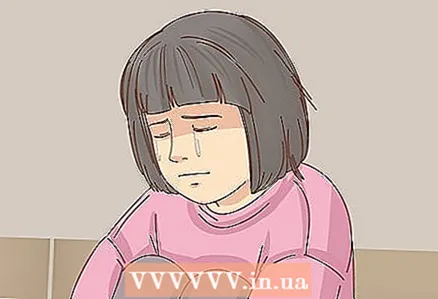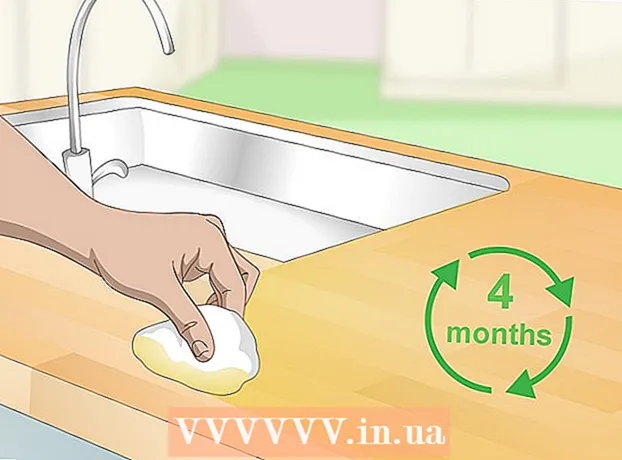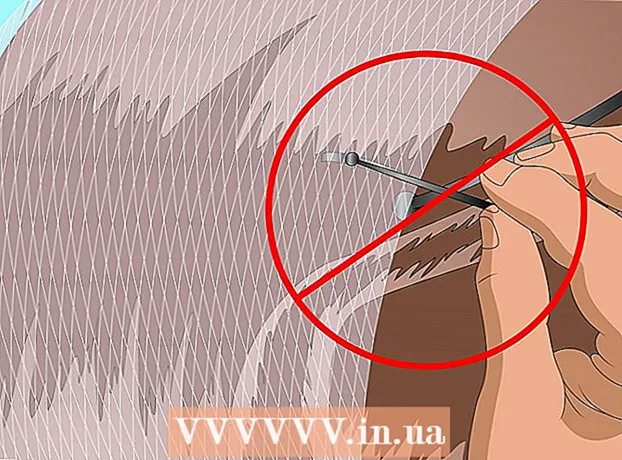
Content
- Steps
- Part 1 of 3: How to Recognize the Signs
- Part 2 of 3: How to Live With Toxic Parents
- Part 3 of 3: How to behave
- Tips
- Warnings
Toxic parents are parents who cause emotional harm to the child's personality through their negative attitudes. Toxic attitudes are not, in themselves, a mental disorder: individuals with these behaviors may or may not have mental illnesses. It is important to recognize toxic parents early in order to take care of the child's well-being. In this case, you should pay attention to the corresponding signs. If your parents are prone to this behavior, you need to learn to live with toxic parents. You can also try to find the best solution to the problem, especially in the case of child abuse.
Steps
Part 1 of 3: How to Recognize the Signs
 1 Pay attention to what your parents say. Toxic parents make the child feel remorse. They can constantly make harsh remarks and criticize. It is not uncommon for toxic parents to disdain the child and his achievements, often shout or use negative comments. More insidious, toxic parents may criticize or abuse their child in very sophisticated ways: hiding criticism behind kind words or manner of speech.
1 Pay attention to what your parents say. Toxic parents make the child feel remorse. They can constantly make harsh remarks and criticize. It is not uncommon for toxic parents to disdain the child and his achievements, often shout or use negative comments. More insidious, toxic parents may criticize or abuse their child in very sophisticated ways: hiding criticism behind kind words or manner of speech. - Consider a classic example in which a child scored well on a test. He says, "Look, I got a five-minus in math!" In this situation, toxic parents may respond, "Okay, why not five plus?" Such a reaction can discredit the child's hard work. He will think that his parents are disappointed.
 2 Toxic parents need attention. Children of toxic parents are often forced to take on a parenting role in situations where parents require constant attention. This often happens when parents are upset or worried about something. Unfortunately, most children are not ready (and should not) take responsibility for the well-being of their parents.
2 Toxic parents need attention. Children of toxic parents are often forced to take on a parenting role in situations where parents require constant attention. This often happens when parents are upset or worried about something. Unfortunately, most children are not ready (and should not) take responsibility for the well-being of their parents. - The main responsibility of parents is to take care of the child, and not vice versa.
 3 Toxic parents are selfish. In an argument with a child, such parents are not able to tame their ego. As a rule, they stop talking to the child until he asks for forgiveness. They simply do not care about the feelings of the child, since they are busy only with themselves. It is difficult for children to cope with such a situation, especially at an early age, when they are not able to understand the reasons for this behavior of their parents.
3 Toxic parents are selfish. In an argument with a child, such parents are not able to tame their ego. As a rule, they stop talking to the child until he asks for forgiveness. They simply do not care about the feelings of the child, since they are busy only with themselves. It is difficult for children to cope with such a situation, especially at an early age, when they are not able to understand the reasons for this behavior of their parents. - Many toxic parents feel the need to control everyone around them. They will be happy only when they get what they want, so they are ready to cruelly treat others (including their children) without the slightest remorse. Often such people are unable to recognize other people's emotions and do not realize the destructive consequences of their own behavior.

Liana Georgoulis, PsyD
Licensed Psychologist Dr. Liana Georgulis is a licensed clinical psychologist with over 10 years of experience. He is currently the clinical director of Coast Psychological Services in Los Angeles, California. Graduated from Pepperdine University with a degree in Psychology in 2009. She is engaged in cognitive behavioral therapy and other types of evidence-based therapy, working with adolescents, adults and couples. Liana Georgoulis, PsyD
Liana Georgoulis, PsyD
Licensed Psychologist"Inconsistency, lack of emotional support and overly exaggerated demands can all be manifestations of toxic behavior."
 4 Toxic parents constantly exude negativity. Everyone is in a bad mood, but such parents rarely have anything good to say.Rather, they will tend to the other extreme: almost every phrase they say is a complaint for any reason. Toxic parents often complain about their children and are not afraid to talk about it in front of the child.
4 Toxic parents constantly exude negativity. Everyone is in a bad mood, but such parents rarely have anything good to say.Rather, they will tend to the other extreme: almost every phrase they say is a complaint for any reason. Toxic parents often complain about their children and are not afraid to talk about it in front of the child. - Negativity breeds negativity. A child who grows up in such an atmosphere acquires such traits himself. On top of that, he considers himself an unworthy person, as his parents constantly talk about his shortcomings.
- Be aware that some toxic parents are nice to everyone but their children.

Liana Georgoulis, PsyD
Licensed Psychologist Dr. Liana Georgulis is a licensed clinical psychologist with over 10 years of experience. He is currently the clinical director of Coast Psychological Services in Los Angeles, California. Graduated from Pepperdine University with a degree in Psychology in 2009. She is engaged in cognitive behavioral therapy and other types of evidence-based therapy, working with adolescents, adults and couples. Liana Georgoulis, PsyD
Liana Georgoulis, PsyD
Licensed PsychologistThere are many behaviors that can be called toxic. There are clearly aggressive behaviors such as shouting, swearing, beating, but there are also more hidden things that can be even more destructive to the child's personality and sense of self. For example, a parent may constantly neglect the child's needs or be overly dependent on him, using him as his personal emotional support system.
 5 Signs of abuse. Toxic parents may abuse their child, insult him, constantly criticize him, or resort to more sophisticated mind games to make the child feel like a bad person. Sometimes they go beyond words and turn to physical or sexual abuse.
5 Signs of abuse. Toxic parents may abuse their child, insult him, constantly criticize him, or resort to more sophisticated mind games to make the child feel like a bad person. Sometimes they go beyond words and turn to physical or sexual abuse. - Any blows (including spanking) are physical violence.
- Any contact with a child of a sexual nature is considered indecent behavior.
- If you suspect that someone you know is cruel to their child, you need to contact the appropriate authorities (even if in doubt). Look for signs such as sudden changes in behavior, extreme withdrawal, pretense and attention seeking, unkempt and disheveled appearance, or clothing that is not suitable for the weather. To be safe is much better than regretting your own inaction. Contact the police, child protection service, or call the nationwide children's helpline number (8-800-2000-122).
- If your parents are abusive to you, tell others about it. Talk to the teacher at your school or report it to the police. If you are afraid to speak, then call the all-Russian number of the children's helpline (8-800-2000-122). You can also contact the Internet service for emergency psychological assistance of the Russian Ministry of Emergencies (http://www.psi.mchs.gov.ru/) and the Help Nearby website (https://pomoschryadom.ru/).
Part 2 of 3: How to Live With Toxic Parents
 1 Find an opportunity to talk. If you have to live with toxic parents, it can be very difficult to cope with emotions. You may be angry a lot. It is important to find a way to let off steam in order to vent your negative emotions. For example, you can keep a diary, but you have to hide it in a safe place away from your parents' eyes. You can use notepad or create a file on your computer. Write down all your thoughts and feelings in a journal.
1 Find an opportunity to talk. If you have to live with toxic parents, it can be very difficult to cope with emotions. You may be angry a lot. It is important to find a way to let off steam in order to vent your negative emotions. For example, you can keep a diary, but you have to hide it in a safe place away from your parents' eyes. You can use notepad or create a file on your computer. Write down all your thoughts and feelings in a journal. - If you wish, you can use the diary to identify negative patterns in your parents' actions and learn how to behave correctly. Write down events that affect you so that you can then think about your options for future behavior in such situations.
- Also, do not forget to indicate the positive points. If your parents make you feel bad about yourself, then it's important to remind yourself that you are not a bad person at all. You may have made a mistake, but all people are wrong. Find at least one positive moment in your actions every day.Even if the situation seems irrelevant, it can significantly affect your self-esteem. Ask friends and family to help you create such a list. Kind words from other people can be encouraging. Try not to reach out to those family members who may be influenced by your parents and have a distorted view of your actions.
 2 Remember, you are not to blame. It is very difficult to be around toxic parents. They seem to have the ability to spread negative emotions and spoil everyone's self-esteem. Alas, many toxic parents have become that way because they themselves grew up in a toxic environment. You are not to blame for their attitude towards you. If you can recognize toxic parents, then you should be proud. You got the opportunity to break the vicious circle and realized that you were not involved in the negative words and actions of your parents.
2 Remember, you are not to blame. It is very difficult to be around toxic parents. They seem to have the ability to spread negative emotions and spoil everyone's self-esteem. Alas, many toxic parents have become that way because they themselves grew up in a toxic environment. You are not to blame for their attitude towards you. If you can recognize toxic parents, then you should be proud. You got the opportunity to break the vicious circle and realized that you were not involved in the negative words and actions of your parents. - It should also be remembered that a person can only control himself. Children do not have to be responsible for the well-being of their parents, but they do have to live in an unhealthy relationship with them. The only way out in such a situation is to monitor your behavior and reactions. It is sometimes helpful to write down ways to deal with different situations in a journal. Also write down your past reactions. What should have been done then? You don't have to practice self-loathing. Learn to correctly assess and control situations.

Liana Georgoulis, PsyD
Licensed Psychologist Dr. Liana Georgulis is a licensed clinical psychologist with over 10 years of experience. He is currently the clinical director of Coast Psychological Services in Los Angeles, California. Graduated from Pepperdine University with a degree in Psychology in 2009. She is engaged in cognitive behavioral therapy and other types of evidence-based therapy, working with adolescents, adults and couples. Liana Georgoulis, PsyD
Liana Georgoulis, PsyD
Licensed PsychologistToxic parents make you doubt yourself. Dr. Liana Georgulis, a licensed clinical psychologist, says: “When a child is trying to solve some basic issues, such as telling a parent that he is hungry and it’s time to eat, toxic parents can use this to force the child doubt the legitimacy of one's needs... Toxic parents make the child believe that he is incredibly flawed, wrong or defective; they make him doubt himself. When doubts are already there, it is very difficult to wean them, and many people seek help from psychotherapy».
 3 Reach out to people you trust. You can tell toxic parents about your feelings, but this is unlikely to help, especially if they do not understand the essence of their actions. The best solution is to ask a trusted adult friend or relative to help you deal with the situation. Another option is to see a psychologist or psychotherapist. Consider in advance a “safe” reason to meet with a specialist. Choose the right person, talk about how your parents feel about you, and get advice.
3 Reach out to people you trust. You can tell toxic parents about your feelings, but this is unlikely to help, especially if they do not understand the essence of their actions. The best solution is to ask a trusted adult friend or relative to help you deal with the situation. Another option is to see a psychologist or psychotherapist. Consider in advance a “safe” reason to meet with a specialist. Choose the right person, talk about how your parents feel about you, and get advice. - Another adult can also act as a kind of intermediary between you and your parents. In the presence of another adult, they cannot simply dismiss you and claim that you are just a child who does not understand anything.
 4 Get away from your parents. Unfortunately, underage children of toxic parents will have to find ways to cope differently. If the parents are abusive, emotionally, physically, or sexually, then leave immediately. There is no excuse for this behavior, and you should not tolerate bullying. Go to a friend or other relative you trust. If you have nowhere to go, then ask your neighbors for help.
4 Get away from your parents. Unfortunately, underage children of toxic parents will have to find ways to cope differently. If the parents are abusive, emotionally, physically, or sexually, then leave immediately. There is no excuse for this behavior, and you should not tolerate bullying. Go to a friend or other relative you trust. If you have nowhere to go, then ask your neighbors for help. - Report the abuse to the appropriate authorities immediately.If you are afraid to call the police, then call the all-Russian children's helpline number (8-800-2000-122). You can also contact the Internet service for emergency psychological assistance of the Russian Ministry of Emergencies (http://www.psi.mchs.gov.ru/) and the Help Nearby website (https://pomoschryadom.ru/). Your appeal will be completely confidential. Find out what to do, where to go and who to call.
Part 3 of 3: How to behave
 1 Move away from the toxic person. When dealing with toxic parents (and toxic people in general), it's best to distance yourself from them. It is not always possible to completely stop communication, but try to intersect as little as possible.
1 Move away from the toxic person. When dealing with toxic parents (and toxic people in general), it's best to distance yourself from them. It is not always possible to completely stop communication, but try to intersect as little as possible. - If you are over 18 years old, then by law you are already an adult who can leave your parental home forever. If you want to try to stay in the relationship, try explaining the reasons for your decision to distance yourself with toxic parents. Perhaps this will serve as a reason for parents to change their attitude, but be prepared for the fact that they will not want to change.
- Consider ending your relationship with your parents. You may miss the people you might be losing too (another parent or siblings). Sometimes it's better to keep the relationship for the sake of the people you love.
- In some cases, it is best to break any bond with toxic parents, especially if they are not going to change anything. Meet good people who will be like family to you. Many people manage to find friends who become, in fact, family members. This decision can be painful, but your life will become happier over time.
 2 It is not always possible to change the situation. If you are living with toxic parents or observing a situation from the outside, it is important to understand that there is not always an opportunity to influence the situation. A person can only control himself. A toxic person will only change if they can admit their mistakes and are willing to make an effort to change their way of thinking and behavior. Unfortunately, only a few people are able to objectively assess themselves and their actions.
2 It is not always possible to change the situation. If you are living with toxic parents or observing a situation from the outside, it is important to understand that there is not always an opportunity to influence the situation. A person can only control himself. A toxic person will only change if they can admit their mistakes and are willing to make an effort to change their way of thinking and behavior. Unfortunately, only a few people are able to objectively assess themselves and their actions. - If you are a close family friend, you can try to convey your opinions and concerns to toxic parents, but this will be a difficult conversation that can end up with a complete end to the relationship. Are you suggesting that the child is being abused? It will be better for everyone involved in the situation if you contact the child protection service or the police, rather than trying to solve the problem on your own.
- It should be understood that it is very difficult to prove the fact of moral bullying if it was not accompanied by physical or sexual abuse. Make a complete list of the signs of abuse you have seen.
- If you are not ready to become an active participant in the situation, try to help the child. If necessary, start supporting your child to feel cared for and loved. Even one kind person in a child's life is always better than nothing.
 3 Try to remember that we are all human. Empathizing with a toxic person is difficult. He put in a lot of effort for this. Try to remember that a toxic person is also a person who has probably faced pain and suffering, even if he himself does not understand it. You are not to blame for this suffering. This perspective will allow you to find some compassion in situations where you have to deal with them.
3 Try to remember that we are all human. Empathizing with a toxic person is difficult. He put in a lot of effort for this. Try to remember that a toxic person is also a person who has probably faced pain and suffering, even if he himself does not understand it. You are not to blame for this suffering. This perspective will allow you to find some compassion in situations where you have to deal with them. - All of the above should not be taken as an excuse to constantly be around toxic people or an attempt to justify their behavior. If the presence of toxic parents depresses you, you have every right not to communicate with them. Nobody cares about your well-being except you.
Tips
- In the process of communication, do not forget about respect. It won't be easy for you, but respect and politeness can sometimes iron out the rough edges.
- Be supportive if a toxic parent tries to change. He may have done you a lot of harm in the past, but admitting your mistakes is always difficult.
Warnings
- Tell the police immediately if you have reason to believe that your child is being emotionally, physically, or sexually abused. No one has the right to treat children like that, who cannot even stand up for themselves.



